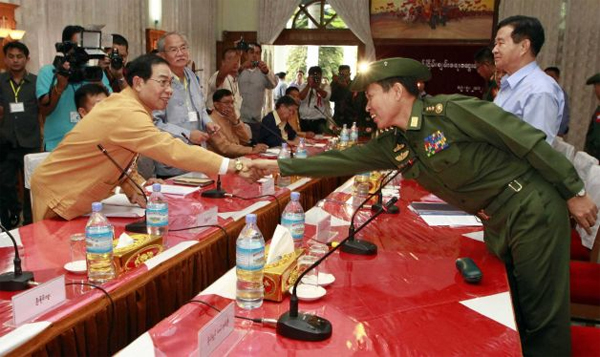The Shan State Army (SSA) ‘South’ sent a letter of protest to Gen Soe Win, Deputy Supreme Commander and Commander of the Burma Army, yesterday following a clash which took place in Laikha, Shan State South, on Wednesday, 27 June.

An SSA patrol was attacked by Burma Army patrol from Infantry Battalion 64, based in Laikha, near Mark Khi Nu mountain, Wan Yerng tract, Laikha township, according to the letter.
This latest clash marks the 24th military confrontations between the two sides since the ceasefire agreement was signed on 2 December 2011, and the 7th since Gen Soe Win first attended the negotiations on 19 May.
Lt. Gen. Yawdserk, left, leader of Shan State Army (SSA), and Gen. Soe Win, chief of Myanmar government negotiation group, shake hands during their meeting in Kengtung, eastern Shan State, Myanmar, Saturday, May 19, 2012. It was second round of peace talks between the government and Shan rebels. Photo: Khin Maung Win / AP
The letter, dated 28 June 2012, and signed by the SSA’s chief liaison officer Brig-Gen Sai Lu, said. “The clashes are taking a terrible toll on the trust-building process.”
So far, there is no response from Gen Soe Win.
The 6 previous clashes, as reported by SHAN, were:
23 May 2012 Pongpakhem, Mongton township, where the Burma Army was “in search of a deserter”
2 June 2012 SSA unit assigned to jointly conduct survey with the Burma Army in Monghta shelled by the Burma Army
16 June 2012 Infantry Battalions (IBs) 225 and 65 attack SSA base in Pongpakhem, Mongton township
17 June 2012 Light Infantry Battalion (LIB) 515 attacks SSA base in Ook Look, Namhsan township
19 June 2012 IB 249 patrol ran into SSA patrol near Na Lawn village, Pang Poi tract, Mongkeung township, due to non-advance notification as agreed earlier
19 June 2012 LIB 575 column attacking SSA at Hsaikhao, Kunhing township
On the other hand, the Restoration Council of Shan State / Shan State Army (RCSS/SSA), as the SSA South is officially known, has been allowed to hold public consultations on current political, military, social and economic situation by Naypyitaw. It was also been discussing with state level Central Committee for Drug Abuse Control (CCDAC), Burma’s answer to the US Drug Enforcement Administration (DEA) and Thailand’s Office of Narcotics Control Board (ONCB). Both sides so far have agreed that cooperation from all state agencies, especially the military, is necessary, if a meaningful result is to be achieved on the drug front.



